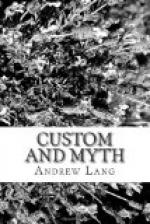* * * * *
We have here a typical example of the way in which mythology puzzled the early philosophers of Greece. Socrates was anxious to be pious, and to respect the most ancient traditions of the gods. Yet at the very outset of sacred history he was met by tales of gods who mutilated and bound their own parents. Not only were such tales hateful to him, but they were of positively evil example to people like Euthyphro. The problem remained, how did the fathers of the Athenians ever come to tell such myths?
* * * * *
Let us now examine the myth of Cronus, and the explanations which have been given by scholars. Near the beginning of things, according to Hesiod (whose cosmogony was accepted in Greece), Earth gave birth to Heaven. Later, Heaven, Uranus, became the husband of Gaea, Earth. Just as Rangi and Papa, in New Zealand, had many children, so had Uranus and Gaea. As in New Zealand, some of these children were gods of the various elements. Among them were Oceanus, the deep, and Hyperion, the sun—as among the children of Earth and Heaven, in New Zealand, were the Wind and the Sea. The youngest child of the Greek Heaven and Earth was ’Cronus of crooked counsel, who ever hated his mighty sire.’ Now even as the children of the Maori Heaven and Earth were ’concealed between the hollows of their parents’ breasts,’ so the Greek Heaven used to ’hide his children from the light in the hollows of Earth.’ Both Earth and her children resented this, and, as in New Zealand, the children conspired against Heaven, taking Earth, however, into their counsels. Thereupon Earth produced iron, and bade her children avenge their wrongs. {49a} Now fear fell on all of them, except Cronus, who, like Tutenganahau, was all for action. Cronus determined to end the embraces of Heaven and Earth. But, while the Maori myth conceives of Heaven and Earth as of two beings which have never been separated before, Hesiod makes Heaven amorously approach his wife from a distance. Then Cronus stretched out his hand, armed with a sickle of iron, or steel, and mutilated Uranus. Thus were Heaven and Earth practically divorced. But as in the Maori myth one of the children of Heaven clave to his sire, so, in Greek, Oceanus remained faithful to his father. {49b}
This is the first portion of the Myth of Cronus. Can it be denied that the story is well illustrated and explained by the New Zealand parallel, the myth of the cruelty of Tutenganahau? By means of this comparison, the meaning of the myth is made clear enough. Just as the New Zealanders had conceived of Heaven and Earth as at one time united, to the prejudice of their children, so the ancestors of the Greeks had believed in an ancient union of Heaven and Earth. Both by Greeks and Maoris, Heaven and Earth were thought of as living persons, with human parts and passions. Their union was prejudicial to their children, and so the children violently separated




